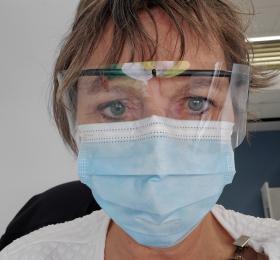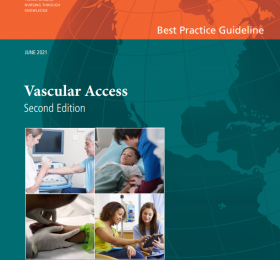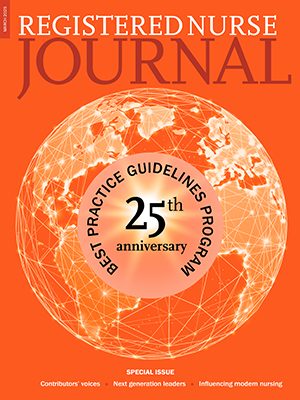Back-to-school plan falls short
RNAO responded to the province’s school reopening guidelines, outlining gaps in the plan. Ontario students lost more days of in-person instruction than those in any other province or territory. While RNAO agrees a return to school is vital, the plan fails to mandate vaccination for teachers and educational staff and neglects to specify physical distancing requirements in schools. “Given how effective vaccines are in the face of the highly transmissible Delta variant and the emerging Lambda variant, nurses will continue to insist on mandatory vaccination for all educational staff, unless they have a medical exemption,” says RNAO CEO Dr. Doris Grinspun. The government plan requires masking for students in Grades 1 through 12, however the association wants this extended to include those in kindergarten. Sign RNAO’s Action Alert to urge the province to implement mandatory vaccination for health-care workers, teachers and educational staff. (inSauga.com, Aug. 3)
Nurses leaving jobs after COVID-19
Many Ontario RNs and NPs will leave the profession, retire early or switch to part-time work due to the workload and emotional toll of COVID-19, RNAO found in its Work and Wellbeing Survey results. About 13 per cent of early-career RNs say they will be leaving the profession compared to the usual attrition of three per cent. The number of RNs and NPs who are at the retiring age who are planning to retire is higher than usual. RNAO CEO Dr. Doris Grinspun says it is not just understaffing but is now a nursing crisis. Some hospitals in Ontario are offering bonuses for out-of-province or retired nurses to become critical care nurses, but Grinspun says that won’t work long term. “That’s a band-aid approach. What we need is the root causes to be dealt with. Bill 124 (legislation that limits wage increases) needs to go, mental health services for nurses need to be increased and workload needs to be decreased. We need to significantly retain and recruit more nurses.” (CTV News, July 23)
Student externships ease staffing pressures in hospitals
The Ontario government pledged more than $117-million to a project to get nursing students into hospitals to help assist with tasks such as bathing, feeding and making beds. The program, called an externship, was developed to help ease the strain on hospital staff during COVID-19’s second wave and was extended in April 2021 to include 38 hospitals with plans to hire more than 4,000 students over the next year. Externships pay students slightly more than minimum wage and allow them to work daily in a hospital setting. Laura Slipp, a recent nursing graduate of the Humber College and University of New Brunswick program in Toronto, completed an externship at Sunnybrook Health Sciences in March 2021. She was then hired to join one of the organization’s resource teams. She says the externship provided the hands-on experience she felt she missed during the pandemic, when clinical placements were restricted. “You learn so much just from being immersed in the hospital setting,” says Slipp. (Globe and Mail, June 1)
Niagara vaccination centre displays messages of hope
At the Seymour-Hannah Sports and Entertainment centre in Niagara, a colourful display of hope covers the glass of the main rink.* The mosaic is comprised of post-it-note messages from attendees of the clinics expressing their relief, hope and gratitude. During the 15-minute waiting period after receiving their vaccine, residents are given a pen and post-it-note to share a message. Thousands of community members have left a message. “Now I can see my great grandchild,” one reads. “RELIEF! Thank you,” reads another. RNAO member and clinical lead NP Christina Huntington says she is humbled by the community’s eagerness to participate. She says the brightly coloured notes provide a daily push to keep going. (Globe and Mail, April 3)
* Niagara Health closed the Seymour-Hannah clinic on Aug. 15 and opened a smaller clinic at its St. Catharines site on Aug. 17.
First academic BPSO in Middle East
The University of Calgary in Qatar (UCQ) is the first academic institution in the Middle East to become an RNAO Best Practice Spotlight Organization (BPSO). Academic BPSOs look to RNAO’s best practice guidelines (BPG) to help nursing students use evidence-based knowledge in their studies and clinical placements. UCQ has integrated BPGs into all of its theoretical and practice-based courses to help nursing students make informed decisions and understand how to achieve better patient outcomes. RNAO announced the designation at its annual general meeting on June 24. “It is an absolute privilege to welcome you and recognize the heavy lifting you have done in the past three years to receive your designation. This is especially commendable as you had to do it throughout a pandemic,” says RNAO CEO Dr. Doris Grinspun. (The Peninsula, July 1)
Alliston nurse comes out of retirement to help with vaccination effort
Retired RN Lois Gilmour recently came out of retirement to help vaccinate her community. Gilmour graduated from the Royal Victoria School of Nursing at Georgian College in 1979. She retired in 2018, after working for 18 years at Orillia Soldiers’ Memorial Hospital. Gilmour decided to return to her profession and is now administering COVID-19 vaccines in a Barrie immunization clinic. She says that being part of the vaccination efforts has been one of the biggest honours of her career. However, she notes that being a nurse during this pandemic hasn’t been easy. “Right now, the challenge is keeping my head above water. You’re always worried if you are taking home the virus to your family. There is a lot that weighs on your head.” (MidlandToday.ca, May 31)
New best practice guideline (BPG) edition on vascular access now available
In June, RNAO published the Vascular Access, Second Edition BPG. This latest edition provides nurses and interprofessional teams with evidence-based recommendations and resources related to the insertion, assessment and maintenance of vascular access devices in the infant, pediatric and adult populations. This BPG combines two previous BPGs: Assessment and Device Selection for Vascular Access (released in 2004) and Care and Maintenance to Reduce Vascular Access Complications (released in 2005). The BPG’s expert panel was led by co-chair Dr. Nancy Moureau, chief executive officer of PICC Excellence, and Darlene Murray, interprofessional education specialist at SickKids. The Canadian Vascular Access Association (CVAA) and the Infection Prevention Society (UK) have endorsed this guideline. “I’m so proud of our expert panel and RNAO staff – Amy Burt and Christine Buchanan (guideline development leads) and others – who made this BPG possible. It is so important that we continue to provide nurses and other health professionals with the most up-to-date evidence-based practice so they can improve patient health outcomes,” says RNAO CEO and founder of the BPG program, Dr. Doris Grinspun. Download Vascular Access, Second Edition on RNAO’s website.
RN launches new magazine highlighting sleep health
On June 4, RN and sleep expert Julia Worrall launched her own magazine focusing on the connection between poor sleep and poor health. Best Sleep Magazine’s first issue included stories about the way poor sleep harms our health, daytime napping, as well as stress and pain during sleep. Before the COVID-19 pandemic, Worrall had attended events as a keynote speaker focusing on the need for more comprehensive sleep programs for first responders and the public. The pandemic has had a significant impact on people’s sleep patterns, she says. Worrall hopes to eventually have the publication available on newsstands. For now, it is available online and at select primary care providers. Read it at bestsleepmagazine.com (Wellington Advertiser, June 10)
RNAO CEO part of new provincial working group on long-term care staffing
RNAO CEO Dr. Doris Grinspun has been appointed by the government as a member of a new action group tasked with helping to implement health-care recruiting and training in Ontario. The Staffing Supply Accelerator Group will support the objectives of the Ontario government’s long-term care staffing plan. Grinspun joins leaders from other stakeholder groups, including the Ontario Long-Term Care Association, AdvantAge Ontario, and the Council of Ontario Universities. The group is tasked with accelerating and expanding the training and education of registered nurses (RN), registered practical nurses (RPN) and personal support workers (PSW). They will focus on four priorities in 2021 –2022: building a PSW learning pathway to include onsite training and micro-credentialing; bridging opportunities for PSWs to become RPNs and RPNs to become RNs; increasing enrolment and accelerating completion of existing training programs in support of long-term care; and removing barriers to enable more internationally trained professionals to become qualified to practice in Ontario. The group first met in March and will operate for at least one year. “The work has been intense, with several sub-groups forming,” says Grinspun. This is necessary if we are to strengthen health human resources – both regulated and unregulated – for the long-term care sector, she adds. “Our seniors deserve to have a good quality of life. To do this, there needs to be adequate staff to care for them,” she insists. Learn more about the Staffing Supply Accelerator Group here.
RNAO recognizes reporters, media outlets for outstanding coverage
Ottawa Citizen reporter Elizabeth Payne was one of the seven recipients to receive an RNAO Media Award this year. Her winning entry focused on a nursing home administrator, Carolyn Della Foresta, who works at Almonte Country Haven, just outside of Ottawa. She explored the sorrow and trauma felt by staff when nearly one-third of the home’s population died during one of the province’s first and deadliest COVID-19 outbreaks in the spring of 2020. RNAO President Morgan Hoffarth was joined by RNAO CEO Dr. Doris Grinspun for the awards presentation and highlighted the important role journalists have had during the pandemic: “Just like the work of nurses, the work of the media has been intense and challenging: covering the pandemic from different viewpoints and shedding light on what needs urgent action. RNAO values the work of all journalists keeping Ontarians informed and engaged,” says Hoffarth. You can read the bios for all of this year’s Media Award winners here. (Ottawa Citizen, June 16)




